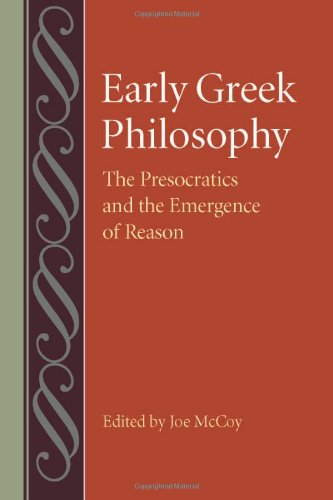

Most ebook files are in PDF format, so you can easily read them using various software such as Foxit Reader or directly on the Google Chrome browser.
Some ebook files are released by publishers in other formats such as .awz, .mobi, .epub, .fb2, etc. You may need to install specific software to read these formats on mobile/PC, such as Calibre.
Please read the tutorial at this link: https://ebookbell.com/faq
We offer FREE conversion to the popular formats you request; however, this may take some time. Therefore, right after payment, please email us, and we will try to provide the service as quickly as possible.
For some exceptional file formats or broken links (if any), please refrain from opening any disputes. Instead, email us first, and we will try to assist within a maximum of 6 hours.
EbookBell Team

4.1
100 reviewsThe scholarly tradition of the Presocratics is the beginning of the "Greek Miracle," the remarkable flowering of arts and sciences in ancient Greece from the 600s to 400s BC. Greek thought turned from pagan religion and the mytho-poetic work of Hesiod and Homer, to inquiry into the natures of things, to the world and our place in it. This tradition, starting with Thales (b. 624 BC) and proceeding through Democritus (d. 370 BC), is the unifying theme of this volume. The contributors, renowned experts in their various fields of philosophy, provide introductions to the Presocratic philosophers and discuss how this philosophical school was appropriated and treated by later philosophers.
Joe McCoy opens the volume with a survey of the historical developments within Presocratic philosophy, as well as its subsequent reception. The essays begin with Charles Kahn's account of the role of Presocractic philosophy in classical philosophy. Individual philosophers are then discussed, namely, Anaximander by Kurt Pritzl, Heraclitus by Kenneth Dorter, and Pythagoreans by Carl A. Huffman. Next are chapters on Xenophanes by James Lesher, Parmenides by Alexander P. D. Mourelatos, Empedocles by Patricia Curd, and Anaxagoras by Daniel Graham. The collection concludes with an examination of the reception of the Presocratics in early modern and late modern philosophy by John C. McCarthy and Richard Velkley, respectively.
The philosophy of the Presocratics still governs scholarly discussion today. This important volume grapples with a host of philosophical issues and philological and historical problems inherent in interpreting Presocratic philosophers.
ABOUT THE EDITOR:
Joe McCoy is adjunct professor of philosophy at the University of Nevada-Reno.
PRAISE FOR THE BOOK